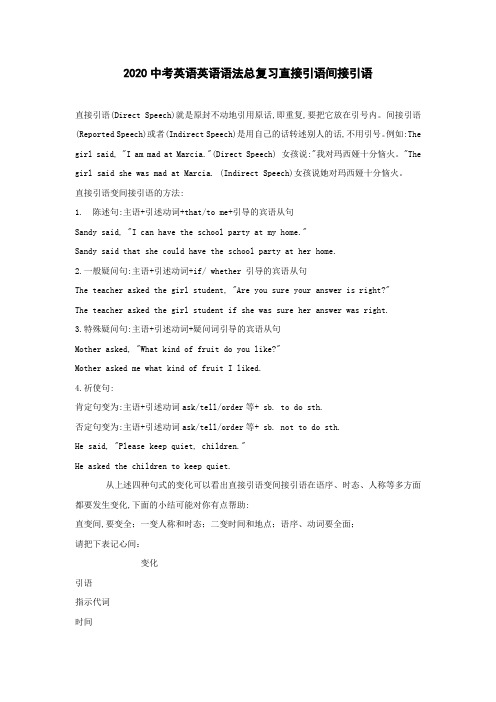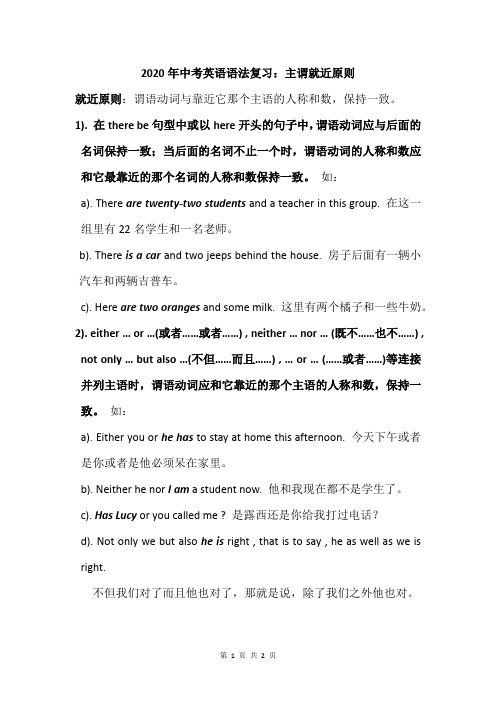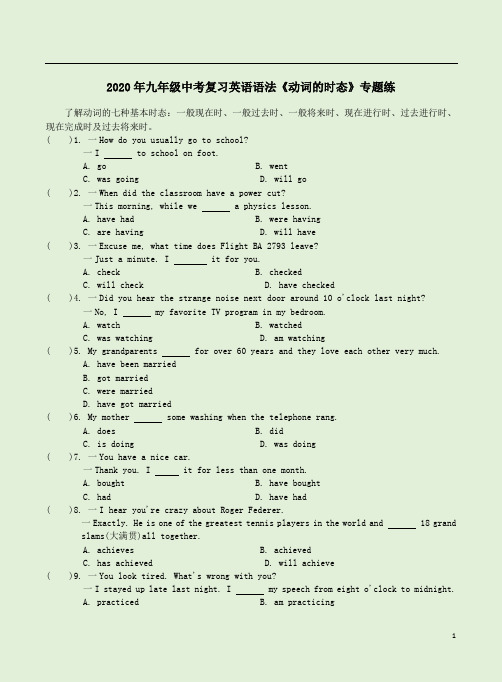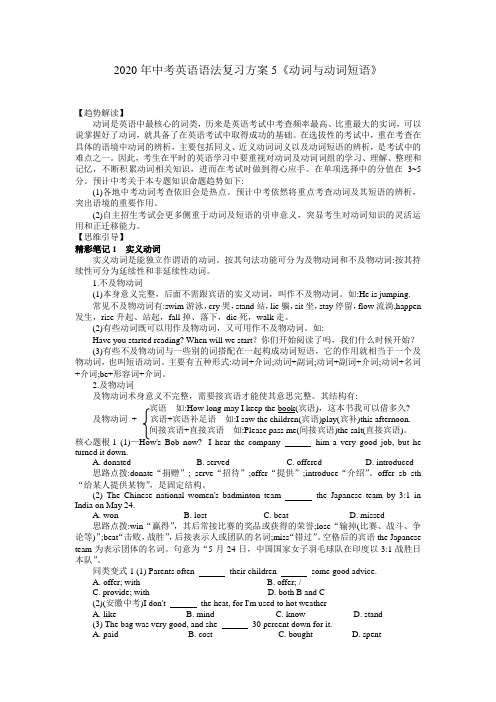2020中考英语语法复习
2020中考英语英语语法总复习直接引语间接引语

2020中考英语英语语法总复习直接引语间接引语直接引语(Direct Speech)就是原封不动地引用原话,即重复,要把它放在引号内。
间接引语(Reported Speech)或者(Indirect Speech)是用自己的话转述别人的话,不用引号。
例如:The girl said, "I am mad at Marcia."(Direct Speech) 女孩说:"我对玛西娅十分恼火。
"The girl said she was mad at Marcia. (Indirect Speech)女孩说她对玛西娅十分恼火。
直接引语变间接引语的方法:1. 陈述句:主语+引述动词+that/to me+引导的宾语从句Sandy said, "I can have the school party at my home."Sandy said that she could have the school party at her home.2.一般疑问句:主语+引述动词+if/ whether 引导的宾语从句The teacher asked the girl student, "Are you sure your answer is right?"The teacher asked the girl student if she was sure her answer was right.3.特殊疑问句:主语+引述动词+疑问词引导的宾语从句Mother asked, "What kind of fruit do you like?"Mother asked me what kind of fruit I liked.4.祈使句:肯定句变为:主语+引述动词ask/tell/order等+ sb. to do sth.否定句变为:主语+引述动词ask/tell/order等+ sb. not to do sth.He said, "Please keep quiet, children."He asked the children to keep quiet.从上述四种句式的变化可以看出直接引语变间接引语在语序、时态、人称等多方面都要发生变化,下面的小结可能对你有点帮助:直变间,要变全;一变人称和时态;二变时间和地点;语序、动词要全面;请把下表记心间:变化引语指示代词时间地点动词直接引语变间接引语 this—that these—thosenow---thentoday--- that daytomorrow—the next daythis year—that yearyesterday—the day before lastnext week—the next weeklast semester---the semester before last here--there come—go said to sb.---told sb.引述词为过去时态直接引语间接引语一般现在时一般过去时现在进行时过去进行时一般将来时过去将来时现在完成时过去完成时一般过去时过去完成时过去完成时过去完成时注意:直接引语变间接引语的变化虽然有规律可循,但要视具体情况而定,例如:"I was born in 1992 in Qiqihar."said he. He said (that) he was born in 1992 in Qiqihar.在上述间接引语中in 1992 已表示事情发生的具体时间,可以清楚看出间接引语的时态先于主句(引述)动词,所以动词不需要变化。
2020年中考英语语法复习:疑问句

2020年中考英语语法复习:疑问句(A). 一般疑问句:联系动词be、助动词、情态动词放在主语前,并用yes和no回答,读音用升调。
如:1). –A re they playing basketball on the playground ? –Yes , they are. / No , they aren’t.他们正在操场玩篮球吗?是的,他们是。
/ 不,他们不是。
2). –Can they borrow books from the library ? –Yes , they can. / No , they can’t.他们能从图书馆里借书吗?是的,能。
/ 不,不能。
3). –Does he have many English novels in his family ? –Yes , he does. / No , he doesn’t.在他家他有很多英文小说吗?是的,他有。
/ 不,他没有。
4). –Did his father go to France last year ? –Yes , he did. / No , he didn’t.他的爸爸去年去法兰西了吗?是的,他去了。
/ 不,他没去。
5). –Will you pass on a message to her ? –Yes , I will. / No , I won’t.你愿意给她传递个消息吗?是的,我愿意。
/ 不,我不愿意。
6). –Would you like a cup of milk , please ? –Yes , I’d like to. / No , thanks.你想要一杯茶吗?是的,我想要。
/ 不,谢谢。
7). –Has he finished his homework ? –Yes , he has. / No , he hasn’t.他完成作业了吗?是的,他完成了。
/ 不,他没完成。
(B). 选择疑问句:句式:“疑问句+or连接的选择部分”不用yes和no回答, 直接回答, 语调为“前升后降”。
2020中考初中英语语法人称代词物主代词反身代词不定代词专题复习

中考初中英语语法人称代词物主代词反身代词不定代词专题复习一、代词的种类:人称代词、物主代词、反身代词、指示代词、不定代词、疑问代词。
1、人称代词,物主代词的用法:默写人称代词(主宾格)和物主代词(形容词性与名词性)。
人称代词物主代词反身代词主格宾格形容词性名词性我I me my mine myself我们你,你们他她它他/她/它们一.用所给动词的适当形式填空1实例回顾,分析方法.1. dog is here.(she)2. Like doing sports.(their)3.The box is .(I)4.my teacher love .(we)5. Let _______ help you.(I)6. It’s time for__________ to have lunch.(she)2真题实践,方法运用.1. She wants to give the cat to_________.(she)2. What’s_________ name, please?(you)3. I didn’t tell_________ the news.(he)4. Can you come with______?(I)5. These books are_______.(their)6. We are going to work in_________ school factory tomorrow.(we)7. The books are new, take care of __________.(they)8. The chair has lost one of________ legs.(it)9. Could you pass________ a piece of paper, please?(she)10. It’s time for__________ to have lunch.(we)11. Mr. Hu will give__________ a talk next week.(you)12. These books are theirs,________ are over there.(you)3. 选择填空1. Who’s that at the door?________is John.A. ItB. HeC. ThisD. That2. _________is a boy. ________name is Jack.A. He, HerB. He, HimC. He, HisD. Him, His3. They are sitting in __________classroom now.A. themB. theirC. theirsD. they4. Mary’s answer is different from________, but I really agree with_______.A. his, herB. his, hersC. him, hersD. him, her5. The Green’s garden is larger tha n________.A. weB. usC. oursD. our6.This is my shirt, I think that one is_______.A. youB. yourC. yoursD. our7. Is this ________book, Kate?No. Ask that girl. I think it’s ________.A.yours, herB. your, hersC. your, herD. yours, hers8. Who’s that at the door?________is Jim.A. ItB. HeC. ThisD. That9. _________is a girl ________name is Mary.A. She, HerB. He, HimC. He, HisD. Him, His10. She is sitting in __________classroom now.A. herB.sheC. hersD. they11. Mary’s answer is different from________, but I really agree with_______.A.mine, herB. my, hersC. me, hersD. I, her12. The Green’s garden is larger than________.A. weB. usC.yoursD. you反身代词1. 作宾语 enjoy oneself玩得开心; be yourself做你自己2. by oneself =alone =on one’s own单独地,独自地3. 搭配: all by oneself 独自;learn by oneself 自学;think to oneself暗暗地想;say to oneself自言自语;teach oneself自学;leave one by oneself把某人单独留下;help oneself 自便1.Those girls enjoyed ____ in the party last night.A. themB. theyC. themselvesD. Herself2. Help ____ to some fish, children.A.yourselfB. yourC. yoursD. yourselves3.The film ____ is very fun.A. it’sB. itselfC. itD. its4. –Who teaches ____ math? –I teach ______.A. your, my selfB. you, myselfC. you, meD. you, herself5. The father will make ____ a bike ____.A. her, himselfB. she, himselfC. her, herselfD. she, herself6. The scarf is ____, she made it_____.A. herself, herB. herself, hersC. hers, herselfD. her, herself7. Liu Hulan’s death was great. She thought more of others than ______.A. herB. sheC. hersD. herself8. Luckily, he didn’t hurt ____ terribly yesterday.A. himB. themselvesC. himselfD. they9. I can’t mend my shoe _____. Can you mend it for _____?A. myself, meB. myself, IC. me, ID. I, me10.I like watching ____ in the mirror.A.meB. IC. myD. myself11. Mary’s ruler is longer than__________A ourB theirC mineD her12. I guess Tom and his sister enjoyed___________at the partyA myselfB himselfC herselfD themselves13. Help_______ to some beef ,my children. It is very deliciousA yourselfB yourselvesC themselvesD himse14. No one taught _____French .He learned it all by________A himself , himB he ,himselfC his , himselfD him , himself不定代词的用法:2)all和both的用法:三个或者以上都: .两个都: .1.There are ________ people in the street.2. I don’t have ________ money, but I have _______ friends.3. _______ foreigners come to visit the Great Wall every day.4. I have so ______ falls that I’m black and blue all over.5. There is too _______ homework for students to do now.6. I want to know whether he has ________ meat.7. Do you know _________ English food?8. I want to buy ________ books to read.3) other、the other和another的用法:其他的:(修饰名词) ..另一个,另一部分;另一....的,另一.....的.(两部分中,另一部分) .再一个,再一个....的(三个及以上的部分): .A.another, other, others, the other, the others1. I only found Jim and Tom there. Where are____?2.Of these three girls one comes from China and______two come from Japan.3.This sweater is a little too big for me. Can I try on(试穿)?4.Some like black tea,_____prefer(偏爱) green tea.5.I don’t like these colors. Show me some_____ , please.6.Have you any____books on this subject?7. Saying is one thing and doing is_______.8. It is always hard to tell the twins one from______.1. He is always ready to help ______.A. anotherB. othersC. the otherD. Other18. They have twenty-six desks in the classroom. One is for the teacher, ______ are for the s tudents.A. the otherB. otherC. the othersD. Others17--- How many more oranges can I have ?--- You can have one more. __________ are for Tom.A. The othersB. AnotherC. OthersD. The other4. I have two color pencils, one is blue and _______is green.A. OtherB. anotherC. the othersD. the other4) 不定代词的用法.somebody (someone), anybody (anyone), everybody (everyone), nobody1.I didn’t know______there.2.There is________in the room. It is empty(空的).3.She is friendly to______. We all like to make friends with her.4.I saw______pass, but I didn’t know w ho it was.D.everyone, every one5.The question is quite easy.________can answer it.6.I believe that_______of us will have a present from them.something,nothing,anything,everything1.Is there______different in today’s newspaper?2.As I know, he knows_______about this old town, so you don’t have to ask him.3.I don’t think he knows______about his family now.4.There is______wrong with my watch. It doesn’t work.5.________is ready now. Let’s start(开始)6. Have you _______ to tell us?A. important somethingB. something importantC. important anythingD. anything important7.Lei Feng asked _________ for return when he helped others.A. everythingB. nothingC. anythingD. Something8.There is _________ in today’s newspaper.A. new anythingB. new somethingC. anything newD. something new9. Why don’t you get _______to read?A. somethingB. everythingC. anythingD. nothing一、英语阅读理解专项练习试卷1.阅读下列短文,从A、B、C、D四个选项中选出最佳选项。
2020年中考英语语法重点纲要

初中英语语法重点汇总Ⅰ. 词法一、名词1、名词的种类❖专有名词❖普通名词✓可数名词个体名词、集体名词✓不可数名词物质名词、抽象名词2、名词的数❖可数名词的数✓单数✓复数➢规则变化●一般情况下词尾-s●以-s、-x、-ch、-sh等结尾的名词词尾-es●以辅音字母-y结尾的词,变y为i,-es●以元音字母-y结尾的词,直接词尾-s●以-f/-fe结尾的词,变f/fe为v,-es●以-o结尾的词,-s或-es➢不规则变化●单词中元音字母发生变化,如man-men,foot,feet●单数复数同形,如sheep-sheep,Chinese-Chinese●复合名词,只变主体名词部分,如boyfriend-boyfriends●其他,如child-children➢特殊情况●只用复数的名词●以-s结尾但并不是复数的名词●集体名词既可以复数,也可以单数●其他❖不可数名词的数✓不可数名词没有复数形式✓有些不可数名词表示具体事物时可数,但意义不同,如chicken,paper3、名词的计量❖可数名词的计量❖不可数名词的计量4、名词所有格❖-’s所有格❖of+名词所有格❖of+-’s 双重所有格❖被名词所有格修饰的名词的省略5、名词在句子中的作用作主语作表语作宾语作宾语补足语作定语作状语作同位语作称呼语二、代词1、人称代词2、物主代词3、反身代词4、相互代词有each other和one another等5、指示代词❖单数:this,that❖复数:these,those6、不定代词❖some和any❖many和much❖both和all❖neither和none❖either、each和every❖another、other(s)和the other(s)✓for another two weeks = for two more weeks ✓some...others...✓one...the other...✓the others = the other +复数❖(a) few和(a) little❖one(s)❖复合不定代词:some-,any-,no-,every-❖复数:these,those7、疑问代词❖指人✓主格:who✓宾格:whom✓所有格:whose❖指物what❖指人或物which8、连接代词who,whom,whose,what,which,whoever,whatever,whichever 9、关系代词who,whom,whose,what,which三、数词1、常见表达法❖日期与时刻✓日期某月某年、某月某日、“月日,年”或“日月,年”✓时刻直接读数表示、用past或to表示❖年龄和年代✓年龄基数词✓年代in the+带有整十的年份的复数或-’s形式❖货币符号+基数词❖编号名词+基数词、the+序数词+名词❖ 小数分数百分数✓ 小数 如three point nine o/zero seven (3.907) ✓ 分数➢ 分子用基数词,分母用序数词,分子大于1时分母序数词后加-s ,如:one third (31),two fifths (52)➢ 分子是2时,常用half ;分子是4时,常用quarter➢ 带分数用“基数词+and+分数”,如:one and two fifths (521)❖ 倍数✓ 倍数+比较级+ than ✓ 倍数+ as +原级+ as ✓ 倍数+ as many/much...+ as...✓ 倍数+ the size/weight/height/length/age...+of... ❖ 约数✓ 大约 about ,nearly ,almost ,some ,around 等 ✓ 超过 over 或more than ✓ 少于 less than ✓ 左右 or so ❖ 算式“+” 用plus 或and ;“-”用minus ;“×”用times 或multiplied by ;“÷”用divided by 2、数词的句法功能❖ 作主语 Twenty of them are from Chonqing. ❖ 作宾语 I like the third best. ❖ 作表语 He is twelve.❖ 作定语 Tom is the tallest of the three boys. ❖ 作状语 Where did you first meet him?❖作同位语We two will help you.3、数词的构成和用法❖基数词✓100以内基数词✓100以上基数词❖序数词✓1~3,4~19✓20~90整十位数✓21以上✓一百、一千、一百万四、介词1、介词的分类简单介词、合成介词、双重介词、短语介词2、介词的位置常规位置、其他位置3、介词短语❖构成介+名,介+代,介+数,介+动名,介+疑问词+不定式,介+从句❖作用作定语、作状语、作表语、作宾语补足语4、介词固定搭配介词与名词、介词与动词、介词与形容词、介词与副词、介词与过去分词5、常见介词用法❖表示时间✓at,in,on✓since,for✓after,in✓by,until/til✓before,after✓from✓during❖表示地点、方位✓at,in,on,to✓on,over,above,under,below✓beside,by,near,nearby,next to,around ✓inside,outside✓into,onto,out of,off✓across,through,past,over,along,down ❖表示方式手段工具✓in,on,by✓in,by,with❖其他✓on,about✓except,except for,besides ✓between,among✓of✓like ✓with✓without ✓for✓as✓against五、冠词1、冠词的用法❖定冠词✓特指的✓谈话双方都知道的✓上文提到的✓独一无二的❖不定冠词✓一类中的任意一个✓第一次谈到✓一类人或物✓数量“一”✓每一,相当于every❖不用冠词✓已有定语✓不可数或复数表一类✓三餐、球类、学科2、冠词的位置❖定冠词❖不定冠词3、有无冠词的区别❖go to school 去上学/ go to the school 到学校去(不一定是学生)❖on earth 究竟/ on the earth 在地球上❖next year 明年/ the next year 第二年❖at table 在吃饭/ at the table 在桌子旁边❖by sea 乘船/ by the sea 在海边❖in bed(睡、病、躺)在床上/ in the bed (某物)在床上❖in class 在上课/ in the class 在班上❖in front of 在(……外部的)前面/ in the front of 在(……内部的)前面六、连词1、按形式简单连词、关联连词、短语连词2、按功能❖并列连词✓表并列and,both...and...,neither...nor...,not only...but also...,as well as✓表转折but,while,yet✓表选择either...or...,or✓表因果so,for❖从属连词✓引导名词性从句主语从句、宾语从句、表语从句、同位语从句✓引导状语从句时间状语、条件状语、原因状语、目的状语、让步状语、结果状语、地点状语、比较状语、方式状语七、副词1、副词的种类时间、地点、频度、方式、程度、疑问、关系、连接、其他2、副词的构成形容词+-ly,与形容词同形3、副词的句法功能作状语、作定语、作表语、作补足语4、副词在句中的位置时间地点、频度、方式、程度、疑问、关系和连接、地点、修饰句子5、副词的比较等级❖构成✓规则✓不规则❖用法6、副词与形容词比较作用不同、句中位置不同、谓语动词7、常见易混副词辨析❖too,either,also,as well ❖already,yet❖ago,before❖hard,hardly❖late,lately❖very,much,very much ❖too,very,quite❖just,just now❖such,so ❖nearly,almost❖fast,quickly,soon❖too much,much too❖how long,how often,how soon ❖farther,further❖sometimes,sometime❖no,not❖maybe,perhaps❖high,highly八、形容词1、形容词的种类性质形容词、叙述形容词2、形容词的构成❖本身就是形容词❖名词+后缀-y,-ful,-less,-ern,-ly,-n❖复合形容词数词+名词、形容词+名词-ed、形容词+动词-ing、名词+动词-ed、副词+动词-ed3、形容词的句法功能作定语、作表语、作宾语补足语、作状语、作主语或宾语4、形容词的位置❖前置或后置❖排序限定词+数量词+描绘性形容词(大小长短形状新旧颜色)+出处+材料+类别用途+名词5、形容词的比较等级❖构成✓规则变化➢long-longer-longest➢nice-nicer-nicest➢big-bigger-biggest➢easy-easier-easiest➢beautiful-more beautiful-most beautiful✓不规则变化➢good/well-better-best➢bad/ill-worse-worst➢little-less-least➢many/much-more-most➢far-farther/further-farthest/furthest➢old-older/elder-oldest/eldest❖用法✓同级比较、同级比较特殊用法✓比较级、比较级特殊用法✓最高级、最高级特殊用法6、含有形容词的固定短语和句型❖固定短语at,about,for,in,of,to,with ❖常用句子✓It’s + adj. + of sb. to do sth.✓It’s + adj + for sb. to do sth.✓sb. be + adj. + to do sth.7、常见易混形容词辨析❖good,fine,nice,well ❖alone,lonely❖interesting,interested ❖exciting,excited ❖ill,sick❖true,real❖huge,large,big,great ❖pleased,pleasant❖elder,older❖farther,further九、动词1、动词的基本形式动词原形、一般现在时第三人称单数、现在分词、过去分词、过去式2、动词的种类❖行为动词及物动词、不及物动词❖连系动词后跟表语❖助动词无意义,语法需要。
中考英语必考重点语法

中考英语必考重点语法2020中考英语必考重点语法一. 词法1. 名词(1)名词的可数与不可数可数名词指表示的人或事物可以用数来计量,它有单数与复数两种形式。
不可数名词指所表示的事物不能用数来计量。
物质名词与抽象名词一般无法用数目,来统计,都成为不可数名词。
不可数名词前一般不能用冠词a、an来表示数量,没有复数形式。
要表示“一个……”这一概念,就须加a piece of这一类短语。
要注意许多名词在汉语里看来是可数名词,在英语里却不可数。
如:chalk,paper,bread,rice,grass,news等。
(2)名词复数的规则变化A.一般情况下加-s。
B.以s, x, ch, sh, 结尾的加-esC.以辅音字母加y结尾的改y为i再加-esD.以f,fe结尾的,去掉f或fe,变成v再加-es(3)名词的所有格A. 单数名词词尾加’s,复数名词词尾若没有s,也要加’s。
如:the worker's bike,the Children’ s ballB. 表示几个人共有一样东西,只需在最后一个人的名字后加’ s若表示各自所有,则需在各个名字后’ s。
如:This is Lucy and Licy’ s room.These are Kate's and jack’ s rooms.C. 如果是通过在词尾加—s构成的复数形式的名词,只加’。
如:the students’ books,the girls’ blouses(另外:名词+of+名词名词是有生命的,我们就用’s结构来表示所有关系。
如果名词所表示的事物是无生命的,我们就要用名词+of+名词的结构来表示所有关系。
)2. 代词人称代词,物主代词,反身代词,指示代词,不定代词(1)人称代词第一人称单数I me my mine myself复数 we us our ours ourselves第二人称单数 you you your yours yourself复数 you you your yours yourselves第三人称单数 he him his his himselfshe her her hers herselfit it its its itself复数 they them their theirs themselves(2)物主代词物主代词的用法:形容词性物主代词后面一定要跟上一个名词;名词性物主代词可作主语、表语、宾语。
2020年中考英语语法复习:主谓就近原则

2020年中考英语语法复习:主谓就近原则就近原则:谓语动词与靠近它那个主语的人称和数,保持一致。
1). 在there be句型中或以here开头的句子中,谓语动词应与后面的名词保持一致;当后面的名词不止一个时,谓语动词的人称和数应和它最靠近的那个名词的人称和数保持一致。
如:a). There are twenty-two students and a teacher in this group. 在这一组里有22名学生和一名老师。
b). There is a car and two jeeps behind the house. 房子后面有一辆小汽车和两辆吉普车。
c). Here are two oranges and some milk. 这里有两个橘子和一些牛奶。
2). either … or …(或者……或者……) , neither … nor … (既不……也不……) , not only … but also …(不但……而且……) , … or … (……或者……)等连接并列主语时,谓语动词应和它靠近的那个主语的人称和数,保持一致。
如:a). Either you or he has to stay at home this afternoon. 今天下午或者是你或者是他必须呆在家里。
b). Neither he nor I am a student now. 他和我现在都不是学生了。
c). Has Lucy or you called me ? 是露西还是你给我打过电话?d). Not only we but also he is right , that is to say , he as well as we is right.不但我们对了而且他也对了,那就是说,除了我们之外他也对。
2020年九年级中考复习英语语法《动词的时态》专题练附答案

2020年九年级中考复习英语语法《动词的时态》专题练了解动词的七种基本时态:一般现在时、一般过去时、一般将来时、现在进行时、过去进行时、现在完成时及过去将来时。
( )1. 一How do you usually go to school?一I to school on foot.A. goB. wentC. was goingD. will go( )2. 一When did the classroom have a power cut?一This morning, while we a physics lesson.A. have hadB. were havingC. are havingD. will have( )3. 一Excuse me, what time does Flight BA 2793 leave?一Just a minute. I it for you.A. checkB. checkedC. will checkD. have checked( )4. 一Did you hear the strange noise next door around 10 o'clock last night?一No, I my favorite TV program in my bedroom.A. watchB. watchedC. was watchingD. am watching( )5. My grandparents for over 60 years and they love each other very much.A. have been marriedB. got marriedC. were marriedD. have got married( )6. My mother some washing when the telephone rang.A. doesB. didC. is doingD. was doing( )7. 一You have a nice car.一Thank you. I it for less than one month.A. boughtB. have boughtC. hadD. have had( )8. 一I hear you're crazy about Roger Federer.一Exactly. He is one of the greatest tennis players in the world and 18 grand slams(大满贯)all together.A. achievesB. achievedC. has achievedD. will achieve( )9. 一You look tired. What's wrong with you?一I stayed up late last night. I my speech from eight o'clock to midnight.A. practicedB. am practicingC. was practicingD. has practiced( )10. 一Do you know the Color Run, a five-kilometer race?一Yes. So far it into quite a few cities in our country.A. comesB. cameC. has come( )11. The house belongs to Mr. Smith, but he here any more.A. hasn't livedB. didn't liveC. wasn't livingD. doesn't live( )12. 一Lily, where is my dog?一Look! It under the bed.A. sleptB. was sleepingC. is sleepingD. will sleep( )13. Simon looks worried because he a writing competition and now he's waiting for the result.A. entersB. enteredC. will enterD. is entering( )14. 一What's the matter, Jack?一I down while I on the ice. I got hurt badly.A. was falling; skatedB. fell; was skatingC. fell; skatedD. was falling; skating( )15. 一Where's your brother?一Oh, he the library and .A. has been to; so Lucy isB. has gone to; so Lucy hasC. has gone to; so has LucyD. has been in; so has Lucy( )16. 一Look! Your teacher Miss White is over there.一No, it can't be her. She to Beijing.A. has goneB. has beenC. wentD. will go( )17. The earth is a planet and it around the sun.A. goesB. goC. will goD. went( )18. When you me last night, I the piano.A. were calling; was playingB. were calling; playedC. called; playedD. called; was playing( )19. 一Did you watch the football match on TV last night?一I wanted to, but my father his favorite TV program.A. watchedB. watchesC. was watchingD. had watched( )20. 一I wonder if Tom this afternoon.一Don't worry. I will tell you as soon as he .A. will come; comesB. comes; will comeC. comes; comes( )21. I've just returned from my trip to London. I many interesting places there.A. visitB. will visitC. am visitingD. visited( )22. Since we began to use the Internet, our lives a lot.A. changeB. had changedC. will changeD. have changed( )23. With the development of science and technology, robot cooks in our families in the future.A. appearB. appearedC. will appearD. is appearing( )24. A little effort every day, and you a big difference.A. makesB. madeC. have madeD. will make( )25. 一Look at my new smartphone.一Wow, it's so cool. When and where you it?A. do; buyB. have; bougtacC. did; buyD. have; had( )26. 一I saw Mr. Smith in the office at ten yesterday morning.一That's impossible. He an English party with us then.A. hasB. hadC. was havingD. has had( )27.一Can you tell me when you are going to arrive there?一I'm not sure. But I'll ring you up as soon as I there tomorrow.A. arriveB. arrivedC. will arriveD. am going to arrive ( )28. Lily is my classmate. We each other since she came to our school.A. knowB. knewC. have knownD. will know( )29.一Oh, my God! I you were in Beijing, too! When did you come?一I have lived in Beijing since 2015.A. don't knowB. didn't knowC. haven't knownD. wasn't known( )30. John and I to visit his grandparents last Sunday afternoonA. goB. wentC. will goD. have gone( )31. 一Where were Bill and David when the teacher came in?一They in the hallway.A. are talkingB. have talkedC. were talkingD. talk( )32. Don't make any noise, because the baby in the next room.A. is sleepingB. sleepsC. will sleepD. was sleeping( )33. 一Look out! Something down from the building.一Dear me! It's too dangerous.A. fellB. fallsC. is falling( )34. 一I wonder if our foreign teacher Mr. White to his hometown next Tuesday.一I'm not sure. But if he returns to his hometown, I him off.A. returns; seeB. will return; seeC. will return; will see ( )35. 一Where is your uncle, Jane?一He is in Guangzhou. He for a month.A. has leftB. has goneC. leftD. has been away( )36. 一Linda is not coming for the party tonight.一But she !A. promisesB. promisedC. will promiseD. had promised( )37. 一How many children do most post-80s' families have?一One. They two in the future, I guess.A. will haveB. hadC. haveD. have had( )38. 一Hey, Kate. I called you at 6: 30 yesterday evening, but you didn't answer.一Oh sorry. I at that time.A. am doing the dishesB. do the dishesC. was doing the dishes( )39. His grandmother for 6 years. But he still misses her very much.A. diedB. has diedC. has been deadD. has been died( )40. 一Paul, I'm busy cooking. Can you give me a hand?一Just a minute. I my e- mail.A. am checkingB. will checkC. have checkedD. was checking( )41. I don't know when he back. Please tell me when he back.A. comes; comesB. comes; will comeC. will come; comes( )42. 一I want to know if he back tomorrow.一I'll call you as soon as he .A. will come; will returnB. will come; returnsC. comes; will return( )43. (2017·凉山)一Last night I went to a concert of Chinese folk music. Erquan Yingyue was sosad but beautiful that I sensed a strong sadness and pain under the beauty.一So it was. The musician who played it last night to play the erhu since hevery young.A. learned; wasB. has learned; amC. has learned; wasD. learned; has been( )44. Several journalists the lawyer about the international case an hour ago.A. interviewB. interviewedC. will interviewD. had interviewed( )45. Even if you learn something well, you it unless you use it.A. forgetB. forgotC. have forgottenD. will forget( )46. He said he to join the basketball club.A. wantsB. is wantingC. wantedD. has wanted( )47. Lin Tao isn't here now. He to Qingdao.A. goesB. wentC. has beenD. has gone( )48.一I wonder if it tomorrow.一Don't worry. If it ,we'll stay at home.A. rains; rainsB. will rain; rainsC. rains; will rainD. will rain; will rain( )49. 一Can I speak to Mrs. Thomson?一Hold on please. She dishes in the kitchen.A. washesB. has washedC. washedD. is washing( )50. Mr. Liu waiting here for about five minutes.A. has beenB. has comeC. cameD. arrived( )51. If it doesn't rain this weekend, we a picnic in the Jinquan Park.A. haveB. will haveC. have hadD. had( )52. 一Did you do anything interesting last Sunday?一Not really. I just at home.A. stayB. stayedC. will stayD. am staying( )53. 一 Where is your mother, Tom?一She the flowers in the garden.A. watersB. is wateringC. wateredD. has watered( )54. Look on the bright side of life, and imagine that you a happy and successful future.A. hadB. will haveC. haveD. have had( )55. It's nice to see you again. We each other since 2016.A. won't seeB. haven't seenC. don't seeD. didn't see( )56. Please be quiet! The students an exam.A. takeB. are takingC. tookD. were taking( )57. 一Did you watch Running Man last night? It was so exciring.一No. I with my grandpa then.A. have talkedB. am talkingC. was talkingD. talked( )58. 一I want to know if your pen pal tomorrow.一If she tomorrow, we'll give her a big surprise.A. will come; will comeB. will come; comeC. will come; comesD. comes; will come( )59. 一What were you doing at nine o'clock last night?一 .A. I take a showerB. I took a showerC. I was taking a showerD. I am taking a shower( )60. My good friend, Lily, to see me next month.A. cameB. comeC. comesD. will come( )61. 一She to anyone for 2 days.一What happened to her?A. didn't speakB. hasn't spokenC. doesn't speakD. haven't spoken( )62. 一It's very dangerous to swim in the pool. Look at the sign.一Oh, I notice it. Thanks for telling me.A. won'tB. don'tC. haven'tD. didn't( )63. Wow! You dinner! Let's eat now.A. cookB. are cookingC. will cookD. have cooked( )64. She wasn't happy because she the concert given by her favorite singer.A. missesB. missedC. will missD. is missing( )65. Betty hard since last term. That's why her exam results are so good!A. has workedB. will workC. workedD. was working( )66. Don't take the dictionary away. I it.A. useB. usedC. am usingD. have used( )67. I'll lend you the storybook as soon as I it.A. will finish readingB. will finish to readC. finish readingD. finish to read( )68. 一Did you hear someone knock at the door just now?一Sorry. I to my friend on the phone.A. was talkingB. talkedC. am talking( )69. 一I'm sorry for being late.一Never mind. The meeting for only 5 minutes. This way, please.A. has begunB. has endedC. has been on( )70. I in the city since I left school.A. liveB. will liveC. was livingD. have lived( )71. I am surprised at the new look of my hometown for it a lot over the years.A. changedB. changesC. will changeD. has changed( )72. Some of my classmates an English play at the art festival two days ago.A. haveB. hadC. has( )73. 一Hello, John. This is Mike. What are you doing now?一I'm watching a football match. It started at 7:30 p. m, and on for another onehour.A. has beenB. wasC. will be参考答案1-10 ABCCADDCCC 11-20 DCBBCAADCA 21-30 DDCDCCACBB31-40 CACCDBACCA 41-50 CBCBDCDBDA 51-60 BBBBBBCCCD61-70 BDDBACCACD 71-73 DBC。
2020年中考英语语法复习5《动词与动词短语》-精选

2020年中考英语语法复习方案5《动词与动词短语》【趋势解读】动词是英语中最核心的词类,历来是英语考试中考查频率最高、比重最大的实词,可以说掌握好了动词,就具备了在英语考试中取得成功的基础。
在选拔性的考试中,重在考查在具体的语境中动词的辨析,主要包括同义、近义动词词义以及动词短语的辨析,是考试中的难点之一。
因此,考生在平时的英语学习中要重视对动词及动词词组的学习、理解、整理和记忆,不断积累动词相关知识,进而在考试时做到得心应手。
在单项选择中的分值在3~5分。
预计中考关于本专题知识命题趋势如下:(1)各地中考动词考查依旧会是热点。
预计中考依然将重点考查动词及其短语的辨析,突出语境的重要作用。
(2)自主招生考试会更多侧重于动词及短语的引申意义,突显考生对动词知识的灵活运用和正迁移能力。
【思维引导】精彩笔记1 实义动词实义动词是能独立作谓语的动词。
按其句法功能可分为及物动词和不及物动词:按其持续性可分为延续性和非延续性动词。
1.不及物动词(1)本身意义完整,后面不需跟宾语的实义动词,叫作不及物动词。
如:He is jumping.常见不及物动词有:swim游泳,cry哭,stand站,lie躺,sit坐,stay停留,flow流淌,happen 发生,rise升起、站起,fall掉、落下,die死,walk走。
(2)有些动词既可以用作及物动词,又可用作不及物动词。
如:Have you started reading? When will we start?你们开始阅读了吗,我们什么时候开始?(3)有些不及物动词与一些别的词搭配在一起构成动词短语,它的作用就相当于一个及物动词,也叫短语动词。
主要有五种形式:动词+介词;动词+副词;动词+副词+介词;动词+名词+介词;be+形容词+介词。
2.及物动词及物动词术身意义不完整,需要接宾语才能使其意思完整。
其结构有:宾语如:How long may I keep the book(宾语),这本书我可以借多久?及物动词+ 宾语+宾语补足语如:I saw the children(宾语)play(宾补)this afternoon.间接宾语+直接宾语如:Please pass me(间接宾语)the salt(直接宾语)。
- 1、下载文档前请自行甄别文档内容的完整性,平台不提供额外的编辑、内容补充、找答案等附加服务。
- 2、"仅部分预览"的文档,不可在线预览部分如存在完整性等问题,可反馈申请退款(可完整预览的文档不适用该条件!)。
- 3、如文档侵犯您的权益,请联系客服反馈,我们会尽快为您处理(人工客服工作时间:9:00-18:30)。
has taught in a village school for 37 years.
A./
B.a
C.an
D.the
3.(2017·青岛中考)Look! There is _A_ bottle on the table
4.(2019·绥化中考)She is _B_ eightyearold girl.
11.(2019·大庆中考)—What do you think of _C_ party
last night?
—Great! All of us had __ good time.
A.a; a B.the; the
C.the; a D.a; the
12.(2019·宜宾中考)Li Qiang is _B__ honest boy. He wants to
the Pacific Ocean太平洋
the Tianshan Mountains天山山脉
The boy can play the piano.
这个男孩会弹钢琴。
★中国的传统乐器前不加the。
(3)用在最高级、表示顺序的序数词、姓氏复数前。 Math is the most difficult subject for me. 对我来说,数学是最难的科目。 The Turners are having lunch. 特纳一家正在吃午饭。 (4)“the+形容词”或“the+可数名词单数”表示类指。 The new is sure to replace the old. 新事物一定会取代旧事物。
A./
B.the
C.a
9.(2019·贺州中考)I think The Reader(《朗读者》)
is _B_ educational TV program.
A.a
B.an
C.the
D./
10.(2019·郴州中考)—Could you go to the movies this evening? —I'd love to. But I'll have _C_ important meeting. A.the B.a C.an
上海乐派思国际教育
冠词
考点1 不定冠词a/an
(1)泛指某个人或物。 A girl is looking for you. 有个女孩在找你。 (2)表示一类人或物。 A dog is a useful animal. 狗是一种有用的动物。 (3)表示“每一”,相当于every或each。 We have six classes a day. 我们每天六节课。
A.a
B.an
C.the
5.(2019·福建中考)Jack is such A__ friendly boy. He gets
along well with his classmates.
A.a
B.an
C.the
6.(2019·兰州中考)There are a lot of _B_ on the grassland. sheepdog is sitting next to them. A.sheep; The B.sheep; A C.sheeps; The D.sheeps; A
(4)构成一些固定短语。 quite a lot/few许多 play a role发挥作用 a little bit有点儿 a couple of两个 all of a sudden突然 once in a while偶尔
a用于辅音音素前,an用于元音音素(不是元音字母)前。 如果名词前有形容词修饰,则要根据形容词的第一个音 素选择用a还是an。
be __ useful person when he grows up.
A.a; an B.an; a
C.a; a
考点2 定冠词
(1)表示特指。 特指某人或物、双方都知道的人或物、上文提到过的人 或物。 Who is the girl over there?那边的女孩是谁? There is a chair in the room. An old man is sitting on the chair. 房间里有一把椅子,椅子上坐着一位老人。
7.(2019·孝感中考)—What do you usually have for breakfast? —Some bread, _B_ egg and a glass of milk. A.a B.an C.the D./
8.(2019·乐山中考)—Did you get up late this morning? —Yes, so after _C_ quick breakfast, I had to run to office.
②以un开头的单词前常用an, 如uncle, unusual, unlucky, unhappy, unpleasant, unknown。 ③以元音音素开头的字母。 Aa, Ee, Ff, Hh, Ii, Ll, Mm, Nn, Oo, Rr, Ss, Xx
以元音音素开头的单词前不定冠词用an 分不清元音音素和元音字母是考生经常触雷的一个点。
1.(2019·安顺中考)-Did you do well in _B_ English exam last week? —Yes, I got __“A”. A.an; the B.the; an C.a; / D.the; a
2.(2019·莱芜中考)Zhi Yueying, _C_ unusual teacher,
①中考中常见的以元音音素开头的重点单词。
orange橘子
eraser橡皮 egg鸡蛋
elephant大象
animal动物 apple苹果
eye眼睛 idea想法 answer答案
umbrella伞
arm手臂 hour小时
interesting有趣的 impolite不礼貌的
important重要的 easy容易的
(2)用在某些特殊名词前。 自然界中独一无二的事物、由普通名词构成的专有名词、 地理名词(江河、海洋、湖泊、山脉、海峡等)、表示弹 奏的西洋乐器的名词前用定冠词。
the sun太阳 the moon月亮 the earth地球
the Great Wall长城
the United States美国
